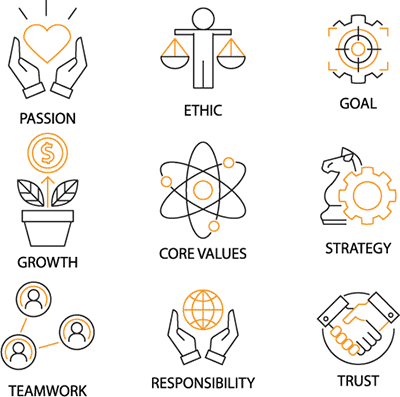In the middle of a raging pandemic, developing a company vision statement is probably low down on the to-do list. As the global economic recession continues, there are undoubtedly lots of important tasks demanding your attention.
However, a company vision statement can be a powerful tool. It provides strategic direction and a framework for company decision-making. And it also serves to motivate and inspire staff to feel part of something bigger than themselves. A compelling vision statement can even differentiate your brand, making you more attractive to customers.
According to Gallup, only 22 percent of US employees strongly agree that company leaders have a clear direction for the business.
Want to get the most out of the workforce and strengthen your brand in challenging economic times? An impactful vision statement can make a difference.
And the good news is crafting a vision statement may not be the daunting task you think it is. Here we take you through all you need to know to develop your company’s perfect vision statement. We also include practical examples to inspire and ignite your creative thinking.
Company Vision Definition
 Let’s get started by defining what we mean by a vision statement.
Let’s get started by defining what we mean by a vision statement.
A vision statement summarizes the meaning and purpose of your company. But it also focuses on future goals and aspirations. In short, it provides a vision of where you want to be. Think of it as a roadmap that signals the company’s future direction.
Vision statements tend to be uplifting and inspiring. However, they also need to be grounded in reality. A pie-in-the-sky, unattainable vision will likely be counterproductive. Instead of motivating the workforce and inspiring customers, it could end up being a turnoff.
Your vision statement isn’t set in stone. Who could have predicted the enormous impact of Covid even 12 months ago? The statement should be revisited and revised regularly to ensure it’s still relevant and fit for purpose.
In summary, a well-crafted vision statement sets the company’s broader strategic direction and supports long-term planning.
Vision Statement vs. Mission Statement
People often get confused about how a vision statement differs from a mission statement. The focus of the mission statement is the here and now. It looks at the who, what, why of your company.  By contrast, a vision statement looks to the future. And it’s primary focus is on where you are headed based on what you are already doing.
By contrast, a vision statement looks to the future. And it’s primary focus is on where you are headed based on what you are already doing.
The two statements should be complementary. They are essentially two faces of the same coin. However, the mission statement details your brand’s purpose, whereas the vision statement considers how you will fulfil that purpose.
Best Practice Tips On Developing A Company Vision
So, what are the essential elements of a vision statement? Here are some best practice pointers on what to include.
- Keep it short. The best company vision statements convey a lot in a few words. Oxfam’s vision is, ‘A world without poverty.’ Google’s vision statement is, ‘To provide access to the world’s information in one click.’ Both are great examples of the power of simplicity and conciseness. The best vision statements are punchy and easy to remember. You can always expand on the statement if you need to in supporting information. However, try to develop an overarching statement in one or two sentences.
- Be clear. Avoid using jargon and technical language. Everyday words and phrases are easy for anyone to understand.
- Focus on one or two goals. It’s tempting to try and include all your aspirations and goals. Your strategic plan, and not the vision statement, is the place to go into the detail. Focusing on one or two vital aspects is more likely to be achievable and deliverable.
- Be relevant. The vision statement should be directly relevant to your company. Avoid generics or platitudes that could apply to any business.
- Focus on the future. Remember, the vision statement is not about where you are at now. It looks to the future and tells the story of where you want to be.
- Be challenging but achievable. Of course, it’s important to be ambitious and set the bar high. However, to have a real impact, the vision statement has to be realistic. Lofty, unattainable vision statements will just end up discarded by staff and customers alike.
- Be inspiring and motivational. The vision statement should see employees feeling excited about the business and keen to get stuck in. Bland statements based on being the best or intangibles like new standards of excellence won’t cut it. Look to excite and energize.
How To Get Started On Your Vision Statement
OK, so now we know the fundamentals around vision statements; where do you start?
- Review company goals. Kickstart the process by reviewing your goals. Bring together a cross-section of staff and managers to review your long-term aims and objectives. Get back to basics and consider what it is you do and the outputs and impacts you deliver. Don’t be afraid to think big. The brainstorming session should be wide-ranging and ambitious, with everything on the table. Use the SMART framework or SWAT analysis to help guide you. Greater clarity around what it is you do, and your goals will inform the vision of how things will look when they are achieved.
- Define what makes you different. What sets you apart from others in the same marketplace? It could be your focus on sustainability or that you use patented technology. If you are struggling for inspiration, take a look at your competitors’ vision statements. It could help you work out what differentiates your business from all the others.
- Relate to human or real-world value in your business. To really hit the mark, your statement must be relatable to the real world. Ask yourself how your organization impacts on people’s lives or the world around us? Make sure the statement is relevant to people – whether staff, customers, or stakeholders. Tell a story that conjures up a picture of where you are heading.
 Test and evaluate. You should now be at the first draft stage. Test out the effectiveness of your vision statement with a sample group of employees. Use the company intranet to gather feedback with a staff pulse survey. Better still, share the draft vision with four or five people independent of your organization – it could be a supplier, stakeholder, even your partner. The aim is to ensure the vision can be easily understood by everyone and is unambiguous and relevant.
Test and evaluate. You should now be at the first draft stage. Test out the effectiveness of your vision statement with a sample group of employees. Use the company intranet to gather feedback with a staff pulse survey. Better still, share the draft vision with four or five people independent of your organization – it could be a supplier, stakeholder, even your partner. The aim is to ensure the vision can be easily understood by everyone and is unambiguous and relevant.- Publish and publicize. Once you have refined the statement, don’t just file it away. The vision statement should be the guiding light for the whole organization. Take every opportunity to publicize and communicate the message. Use all internal communication channels, including the company intranet, staff newsletters, team chat, and #channels. Some businesses use the vision statement as a framework for setting individual and team goals. And others make it a focus for monitoring performance in annual appraisals.
- Review and refresh. Although it’s forward-focused, the vision statement isn’t cast in stone. It’s a living statement. Regularly revisit and revise it to reflect changing circumstances. Incorporate review mechanisms to ensure your vision statement remains relevant and continues to inspire employees.
Real-World Examples Of Vision Statements
Here’s a selection of some effective corporate vision statements from well-known brands.
Amazon: ‘To be the Earth’s most customer-centric company where customers can find and discover everything they might want to buy online.’
Coca-Cola: ‘Our vision is to craft the brands and choice of drinks that people love, to refresh them in body and spirit. And done in ways that create a more sustainable business and better shared future that makes a difference in people’s lives, communities, and our planet.’
Starbucks: ‘To establish Starbucks as the premier purveyor of the finest coffee in the world while maintaining our uncompromising principles while we grow.’
Samsung: ‘Inspire the world, create the future.’
Ben & Jerry’s: ‘Making the best ice cream in the nicest possible way.’
Amnesty International: ‘Our vision is a world in which every person enjoys all of the human rights enshrined in the Universal Declaration of Human Rights and other international human rights standards.’
Apple: ‘To make the best products on Earth, and to leave the world better than we found it.’
Walmart: ‘To be the destination for customers to save money, no matter how they want to shop.’
These vision statements tick all the boxes. Short, punchy, and easy to understand; they are also powerful, passionate, and memorable.
However, the corporate giants don’t have a monopoly on the best vision statements. Here are a few examples from more humble organizations.
 How about this one from MyHub customer, home decorating specialists, Guthrie Bowron: ‘The vision for Guthrie Bowron is to be New Zealand’s most inspiring and popular home decorating destination.’
How about this one from MyHub customer, home decorating specialists, Guthrie Bowron: ‘The vision for Guthrie Bowron is to be New Zealand’s most inspiring and popular home decorating destination.’
Washington-based, MyHub customer SportsArt has the following memorable vision statement: ‘Turn every workout into usable, clean and renewable energy.’
Another MyHub customer, Scotland Excel, provides consultancy, procurement, and training services to local governments. The company’s vision statement is: ‘To provide innovative, transformative solutions for local and national public services across Scotland.’
Northern California’s Marin County, also a MyHub intranet user, has the following vision statement: ‘To provide excellent services that support healthy, safe and sustainable communities; preserve Marin’s unique environmental heritage; and encourage meaningful participation in the governance of the County by all.’
These examples demonstrate that even smaller organizations with limited time and resources can also craft strong vision statements.
Company Vision Statements: Inspire And Motivate
Busy executives sometimes make the mistake of dismissing vision statements as being irrelevant waffle and fluff. But the truth is vision statements are powerful tools for inspiring and motivating employees. They can also help differentiate your brand, making it easier to attract top-quality talent and discerning customers.
 A compelling vision statement will see your staff excited to come to work. Passionate and engaged, workers will give their best every day.
A compelling vision statement will see your staff excited to come to work. Passionate and engaged, workers will give their best every day.
And in a crowded marketplace, a strong vision statement sets you apart, giving you that all-important edge over the competition.
However, vision statements also have a place in strategic planning. They help shape decision-making and goal-setting, providing a strong sense of direction.
So, if you are starting the new year with a new vision statement, then here are the important takeaways:
- Keep it short and simple.
- Make it relevant, challenging but also realistic.
- Involve staff in shaping the vision statement.
- Make it a central part of company planning.
- Review and tweak it on a regular basis.
- Aim to ignite passion and belief in workers.
MyHub is a leading provider of cloud intranet software. From improved communications and collaboration to streamlined processes, our intranets are designed to create a better workplace. Easy to set and quick to deploy, MyHub intranets are used by businesses worldwide.
If you want to find out more about how intranet software can deliver your company’s vision statement, then get in touch. Sign up for a free demo today. Or try out our software in your company with a 14-day no-obligation trial.








0 Comments